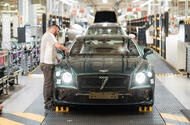UK-made vehicles are set to benefit from a significant reduction in tariffs for exports to the United States, thanks to recent negotiations between UK officials and the Trump administration. The new tariff rate is now 10% for the first 100,000 cars exported from the UK, a notable drop from the previously proposed 25%. This change comes after a series of discussions aimed at easing the financial burden on UK car manufacturers, who were facing a potential crisis due to the earlier tariff announcements.
What Does This Mean for UK Car Manufacturers?
The automotive industry in the UK has been holding its breath since President Trump first announced sweeping tariffs on foreign-made products. The initial 25% tariff on new cars was a cause for concern, particularly since the US is the second-largest market for UK-made vehicles, accounting for about 27% of all exports. In 2024 alone, the UK exported approximately 102,000 cars to the US, generating around £9 billion in revenue. With the new 10% tariff in place, manufacturers can breathe a little easier, knowing they have a fighting chance in one of their most lucrative markets.
Keir Starmer, the leader of the UK Labour Party, emphasized the importance of this reduction, stating that it represents a “huge and important reduction.” He also hinted that there might be room to increase the quota of cars eligible for the lower tariff, which could further benefit the industry.
The Impact on Consumers and Industry
For consumers, this tariff reduction could mean more competitive pricing on UK-made vehicles in the US market. Brands like Jaguar Land Rover, which exports a significant number of cars to the US, are likely to feel the positive effects of this deal. JLR had previously paused shipments to the US in response to the tariff uncertainty, but with this new agreement, they can resume operations with a more optimistic outlook.
Mike Hawes, the CEO of the Society of Motor Manufacturers and Traders, expressed his relief at the news, calling it “great news for the industry and consumers.” The agreement alleviates a severe threat to UK automotive exporters, allowing them to approach the future with renewed confidence.
What About Other Tariffs?
While the reduction in the car tariff is a significant win, the details surrounding other tariffs, particularly the proposed 25% levy on car parts, remain unclear. This aspect could still pose challenges for manufacturers who rely on parts imported from various countries. Additionally, the negotiations between the EU and the US are ongoing, which means that the landscape of international trade in the automotive sector is still evolving.
The Bigger Picture
This deal marks a crucial milestone in trade relations between the UK and the US, especially as the UK becomes the first country to secure an agreement following Trump’s tariff announcements. The implications of this agreement extend beyond just the automotive sector; it signals a willingness from both sides to collaborate and find common ground in trade.
President Trump celebrated the agreement as a “breakthrough trade deal,” highlighting the historical ties between the two nations. As the details continue to unfold, it will be interesting to see how this agreement shapes the future of trade not just for cars, but for other sectors as well, including food, chemicals, and machinery.
The big takeaway? This tariff reduction isn’t just about numbers—it’s about fostering stronger trade relationships. As the automotive industry adapts to these changes, one thing is clear: the road ahead looks a bit smoother for UK car manufacturers. If you’re in the market for a new vehicle, keep an eye on how these changes might affect your choices in the coming months.

